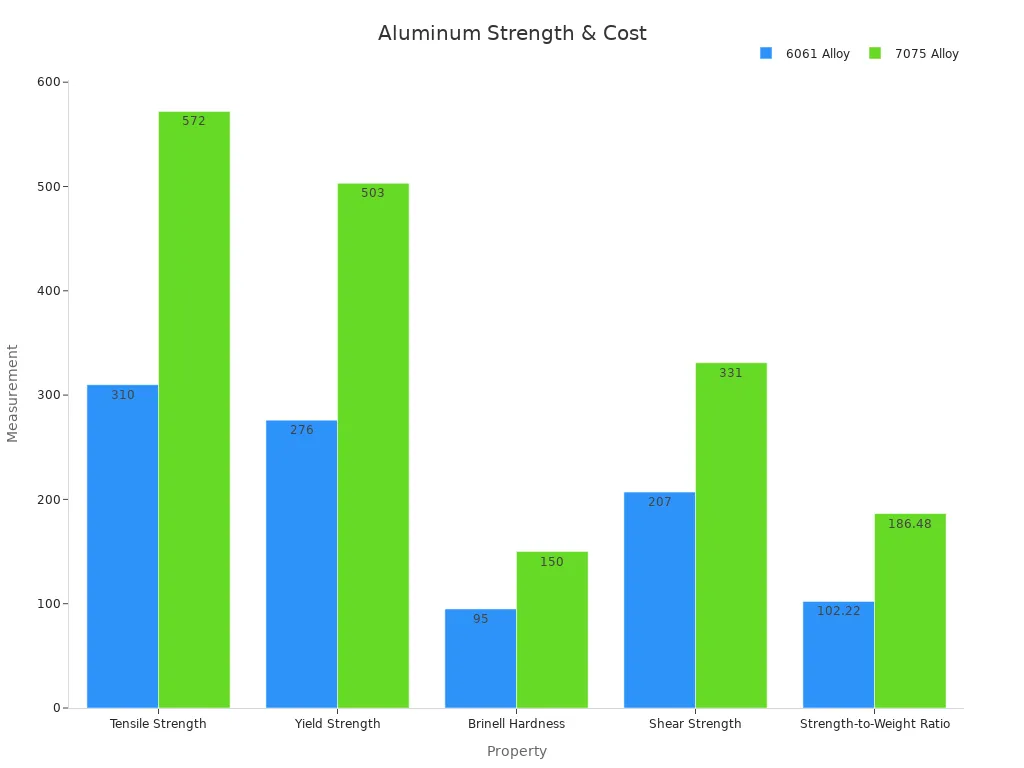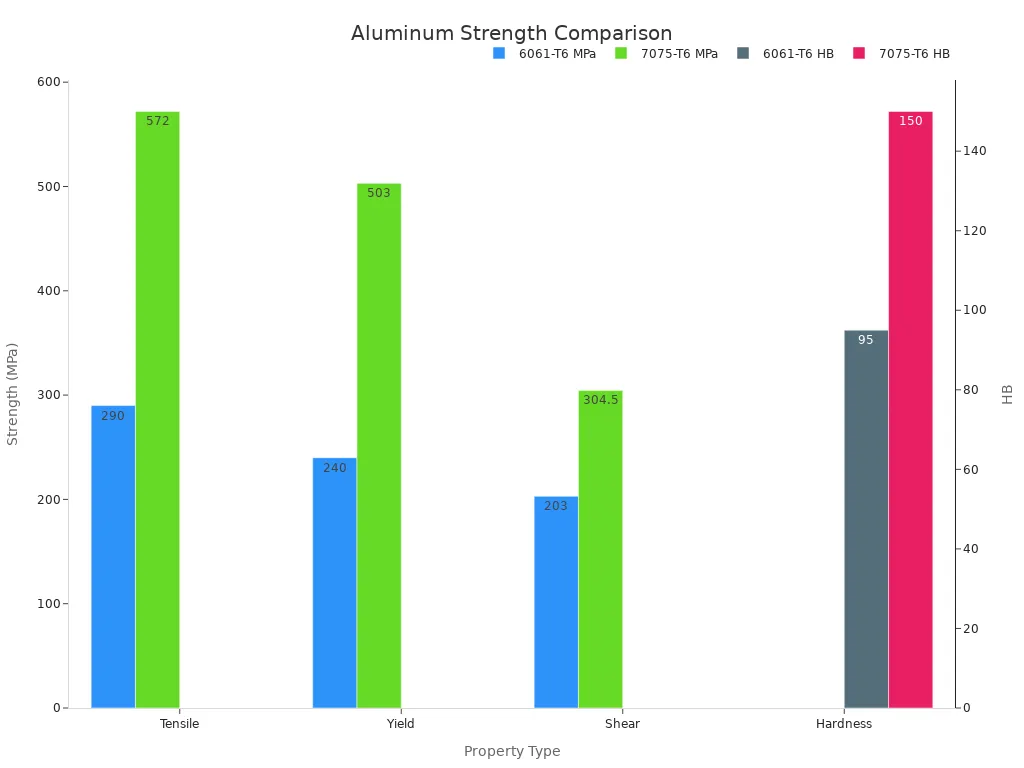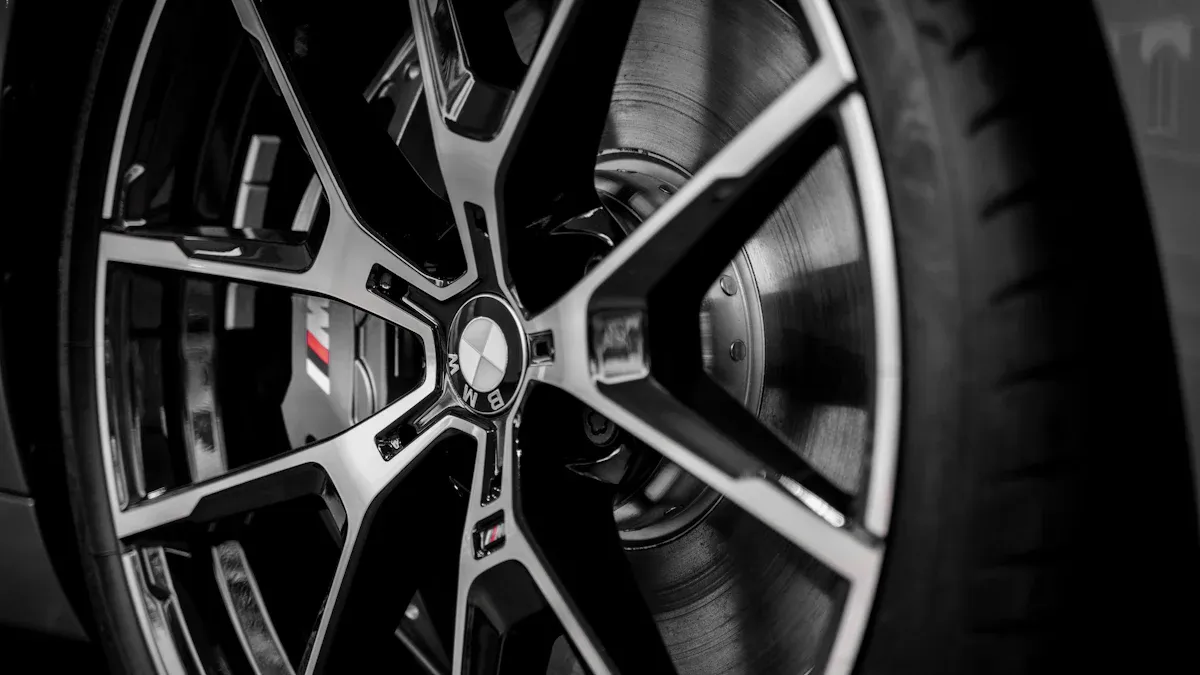Jul.
01, 2025
Contents
6061 vs 7075 Aluminum: What's the Difference?
 When comparing 6061 vs 7075 aluminum, you’ll notice significant differences in strength, hardness, corrosion resistance, and cost. The 7075 aluminum alloy boasts nearly twice the tensile strength of 6061, making it much harder as well. However, 7075 aluminum comes with a price premium of 20-40% more than 6061. On the other hand, 6061 aluminum is easier to machine and offers better corrosion resistance, which makes it an excellent choice for welding and general construction projects. The table below highlights the key differences between 6061 vs 7075 aluminum:
When comparing 6061 vs 7075 aluminum, you’ll notice significant differences in strength, hardness, corrosion resistance, and cost. The 7075 aluminum alloy boasts nearly twice the tensile strength of 6061, making it much harder as well. However, 7075 aluminum comes with a price premium of 20-40% more than 6061. On the other hand, 6061 aluminum is easier to machine and offers better corrosion resistance, which makes it an excellent choice for welding and general construction projects. The table below highlights the key differences between 6061 vs 7075 aluminum:
| Property | 6061 Aluminum Alloy | 7075 Aluminum Alloy | Notes |
|---|---|---|---|
| Tensile Strength | 310 MPa | 572 MPa | 7075 is nearly 2x stronger |
| Yield Strength | 276 MPa | 503 MPa | 7075 is about double |
| Brinell Hardness | 95 | 150 | 7075 is much harder |
| Cost | Baseline | 20-40% more | 7075 costs more |

6061 aluminum is known for being strong and easy to work with. It does not rust easily, so it lasts in many places. This alloy is strong and can handle stress well. You can cut and weld it without much trouble. It is good for making things with tricky shapes. 6061 aluminum also stands up to different types of corrosion, like pitting and cracking.
Here is a summary of important physical and mechanical properties for 6061 aluminum:
| Property | Description / Values |
|---|---|
| Tensile Strength | Goes up by 14.93% with up to 9 wt% ZrO2 added compared to regular 6061 alloy |
| Yield Strength | Gets better as you add more ZrO2 (3%, 6%, 9 wt%) |
| Microhardness | Goes up by 17.47% with ZrO2 added |
| Elongation (Ductility) | Gets lower as you add more ZrO2, so it bends less |
| Corrosion Resistance | Very good in regular 6061; ZrO2 makes the surface even better against corrosion |
| Machinability & Weldability | 6061 alloy is very easy to cut and weld |
| Anisotropy | Strength changes a bit depending on how you process it, about 9.4% difference between X and Y ways |
Tip: If you want something strong, that does not rust, and is easy to shape, 6061 aluminum is a great pick.
6061 aluminum is used in many fields because it works so well. Here are some common ways people use it:
Automotive: 6061 aluminum is in car parts like frames and panels. These parts help cars use less gas and work better, especially electric cars.
Construction: Builders use this alloy for walls, window frames, roofs, and decorations. It can be shaped in many ways and lasts a long time, so it is good for buildings.
Aerospace: Airplane makers use 6061 aluminum for wings and body parts. Its strength and ability to handle stress make it good for planes.
Sporting Goods: Many bikes and outdoor gear use 6061 aluminum. It is light and strong, so it is great for sports equipment.
Sustainability: 6061 aluminum can be recycled easily, which helps the environment and cuts down on waste.
You can pick 6061 aluminum for jobs that need something strong, that does not rust, and is simple to use. Its use in many areas shows it is trusted and valuable.
7075 aluminum is known for being very strong and hard. This alloy can hold heavy weight and high stress. It does not bend or break easily. The tensile strength is often over 570 MPa. The yield strength is usually above 500 MPa after heat treatment. These numbers show it is one of the strongest aluminum alloys.
Scientists test the hardness of 7075 aluminum with Vickers and Brinell tests. These tests prove it is harder than most other aluminum types. If you heat 7075 aluminum to high temperatures, it gets even stronger. The grain structure changes and makes it more even. This process is called dynamic recrystallization. It helps the alloy stop cracks and wear.
Some 7075 aluminum comes from recycled airplane parts. After heat treatment, recycled 7075 bars can reach about 591 MPa tensile strength. The yield strength can be 534 MPa. These numbers are better than some industry standards. Welded 7075 aluminum can get stronger and more flexible with special welding. Some welding methods can raise the ultimate tensile strength by over 20%. They also help the metal stretch more before breaking.
Note: If you want something with high strength, hardness, and good fatigue resistance, 7075 aluminum is a great choice.
7075 aluminum is used in many jobs that need strength and toughness. Its high strength-to-weight ratio is good for parts that must be light but strong.
Aerospace: 7075 aluminum is used in fuselage frames, wing spars, landing gear, and other supports.
Military: This alloy is found in armor plating, aircraft parts, missile pieces, and tactical gear.
Transportation: High-performance car parts, racing car pieces, mountain bike frames, and marine hardware use 7075 aluminum.
Sporting Goods: Climbing gear, archery tools, baseball bats, and top fishing reels use this alloy for safety and performance.
| Industry Segment | Typical Applications |
|---|---|
| Aerospace | Aircraft frames, wing spars, landing gear |
| Automotive | Suspension, chassis, racing parts |
| Military | Armor, aircraft, missiles, tactical equipment |
| Sporting Goods | Climbing gear, bats, fishing reels |
You can trust 7075 aluminum when you need something strong that lasts. Its use in important parts in many fields shows it works well.
When you compare 6061 vs 7075 Aluminum, you see a big difference in strength. 7075 aluminum is much stronger than 6061. If you need a part that can handle a lot of force, 7075 is the better choice. The numbers below show how much stronger 7075 is:
| Property | 6061-T6 Aluminum | 7075-T6 Aluminum |
|---|---|---|
| Tensile Strength | 290-306 MPa | 572 MPa |
| Yield Strength | 240-293 MPa | 503 MPa |
| Hardness (Brinell) | 95-112 HB | 150 HB |
| Shear Strength | Baseline | ~1.5× 6061-T6 |

You can see that 7075 aluminum has almost double the tensile and yield strength of 6061. This makes it a top pick for high-stress jobs like airplane parts or racing bikes.
Corrosion resistance tells you how well a metal stands up to rust and other damage from water or air. In the 6061 vs 7075 Aluminum debate, 6061 comes out ahead. It resists corrosion better than 7075. This means 6061 lasts longer in wet or salty places.
| Metric | 6061 Aluminum | 7075 Aluminum |
|---|---|---|
| Corrosion resistance ranking | 3rd | 4th |
| Tensile strength loss | 32.4% | 42.4% |
| Elongation loss | 26.3% | 31.8% |
7075 aluminum has more zinc and copper. These metals make it strong, but they also make it rust faster. If you need a part for a boat or a place with lots of moisture, 6061 is the safer choice.
Tip: Choose 6061 aluminum for outdoor or marine projects where corrosion is a big concern.
Machinability means how easy it is to cut, drill, or shape the metal. When you look at 6061 vs 7075 Aluminum, 6061 is easier to machine. It is softer and does not wear down your tools as fast.
6061 aluminum is easy to machine because it has magnesium and silicon. These elements help your tools last longer.
7075 aluminum is harder and stronger. This makes it tougher to cut and can wear out your tools quickly.
6061 is also easier to bend and form into different shapes.
If you want to save time and money on machining, 6061 is the better choice.
Weldability tells you how well you can join pieces of metal together using heat. 6061 aluminum is much easier to weld than 7075. You can use many welding methods with 6061, and the welds are strong.
7075 aluminum is tricky to weld. Its high zinc content makes it prone to cracking when you try to weld it. Most people use bolts or rivets instead of welding for 7075 parts. Some new welding methods and special filler rods can help, but they are not common in most shops.
Note: If you need to weld your project, pick 6061 aluminum. It gives you strong, safe joints.
Thermal conductivity shows how well a metal moves heat. In the 6061 vs 7075 Aluminum comparison, 6061 wins again. It moves heat better than 7075. This makes it a good choice for things like radiators, heat sinks, or car parts that get hot.
6061 aluminum has a thermal conductivity of about 170 W/m-K.
7075 aluminum has a lower value, around 130 W/m-K.
If your project needs to get rid of heat fast, 6061 is the right pick.
Cost is always important when you choose a material. 6061 aluminum costs less than 7075. You can save 20-40% by picking 6061 for your project.
| Property | 6061 Aluminum | 7075 Aluminum |
|---|---|---|
| Cost | Baseline | 20-40% more |
7075 aluminum is more expensive because it is harder to make and has more zinc and copper. If you do not need the extra strength, 6061 gives you good value for your money.
Summary Table: 6061 vs 7075 Aluminum
| Feature | 6061 Aluminum | 7075 Aluminum |
|---|---|---|
| Strength | Good | Excellent |
| Corrosion Resistance | Excellent | Good |
| Machinability | Excellent | Fair |
| Weldability | Excellent | Poor |
| Thermal Conductivity | Higher (170 W/m-K) | Lower (130 W/m-K) |
| Cost | Lower | Higher |
You can use this table to help decide which alloy fits your needs. Think about what matters most for your project: strength, corrosion resistance, machinability, weldability, heat transfer, or cost. The 6061 vs 7075 Aluminum comparison helps you make the best choice.

Both 6061 and 7075 aluminum are used in buildings. 6061 is a good pick if you want something light that does not rust. It can be as strong as mild steel, but it weighs less. You can make cool shapes with it for creative designs. 7075 is stronger than 6061. You might use 7075 for parts that hold heavy things or need to be extra tough.
| Property | 6061 Aluminum | 7075 Aluminum | Structural Steel |
|---|---|---|---|
| Strength | Moderate | High | High |
| Weight | Low | Low | High |
| Corrosion Resistance | High | Good | Low |
| Design Flexibility | High | Moderate | Moderate |
Pick 6061 if you want easy building and no rust. Choose 7075 if you need the strongest frame that is still light.
Saltwater can damage metal fast. 6061 aluminum does not rust much, so it is great for boats and docks. 7075 is strong, but it can rust faster in salty or wet air. Saltwater can make 7075 crack and get weak over time.
6061 is good for boat hulls, railings, and ladders.
7075 is not a good choice for things in saltwater for a long time.
For boats and docks, always use 6061. It lasts longer and needs less fixing.
Guns need metal that is strong but not heavy. 7075 aluminum is used for gun receivers and other parts that take a lot of force. 6061 is easier to cut and weld, so it is used for smaller parts or custom guns. New welding tricks can make both alloys stronger, but 7075 is still better for stopping bullets.
Use 7075 for receivers, bolts, and parts that take stress.
Use 6061 for grips, rails, and add-ons.
For the best and safest guns, 7075 is the top choice.
If you build things and want metal that is easy to work with, 6061 is a smart pick. You can cut, bend, and weld it without trouble. 7075 is harder and stronger, but it is tough to shape and weld. For most jobs, 6061 gives you good strength, costs less, and is easy to use.
| Process | 6061 Aluminum | 7075 Aluminum |
|---|---|---|
| Machining | Easy | Moderate |
| Welding | Excellent | Poor |
| Bending | Good | Fair |
| Cost | Lower | Higher |
For most building jobs, 6061 is the best pick. It saves money and time and works well.
When you choose between 6061 vs 7075 Aluminum, you need to look at more than just strength or cost. You should think about what your project needs most. Some projects need high strength. Others need good corrosion resistance or easy welding. You can use a simple checklist to help you decide:
Strength: Pick 7075 if you need the highest strength for things like aircraft parts or gun receivers.
Corrosion Resistance: Choose 6061 for outdoor, marine, or wet environments.
Machinability and Weldability: Go with 6061 if you want easy cutting, bending, or welding.
Cost: Select 6061 for budget-friendly projects.
Heat Dissipation: Use 6061 for parts that must move heat away quickly.
🛠️ You can use decision-making tools that compare numbers like tensile strength, hardness, cost, and corrosion resistance. These tools help you weigh each property and see which alloy fits your needs best. Some engineers use methods like AHP or the Ashby approach to rank alloys for each job. These systems look at all the data and help you make a smart choice.
You might also see automated systems in car factories. These systems use real test data and many criteria to pick the right alloy for each part. They help you balance trade-offs, like picking between strength and cost, or between corrosion resistance and machinability.
If you want a structured way to choose, try making a table. List your project needs and score each alloy for those needs. This helps you see the best match at a glance.
| Project Need | 6061 Aluminum | 7075 Aluminum |
|---|---|---|
| High Strength | Good | Excellent |
| Corrosion Resistance | Excellent | Good |
| Easy Machining | Excellent | Fair |
| Easy Welding | Excellent | Poor |
| Low Cost | Yes | No |
You can use this table as a starting point. Match your top needs to the right alloy. This way, you get the best results for your project.
When you look at 6061 and 7075 Aluminum, you notice big differences. 7075 is much stronger and harder than 6061. 6061 can bend more before it breaks. 7075 does not wear out as fast as 6061. 7075 also lasts longer if you use it over and over. 6061 is better at moving heat away from hot spots.
| Property | 6061 Aluminum | 7075 Aluminum | Practical Implication |
|---|---|---|---|
| Yield Strength | 276 MPa | 503 MPa | 7075 is stronger for high-stress jobs |
| Elongation at Break | 10% | 7.9% | 6061 bends more before breaking |
| Hardness (Brinell) | 95 | 150 | 7075 resists wear better |
| Fatigue Strength | 96 MPa | 160 MPa | 7075 lasts longer under repeated use |
| Thermal Conductivity | 167 W/m-K | 130 W/m-K | 6061 moves heat away faster |
Pick 7075 if you need the most strength or want it to last longer. Choose 6061 if you want better rust protection, easier cutting, or to save money. Always pick the alloy that fits your project best.
You will find that 7075 aluminum is much stronger than 6061. 6061 aluminum is easier to weld and resists rust better. 7075 costs more but works best for high-stress jobs.
You should avoid welding 7075 aluminum. It cracks easily when you try to weld it. Most people use bolts or rivets instead. If you need to weld, 6061 aluminum is a better choice.
6061 aluminum works better for outdoor projects. It resists rust and corrosion from rain or saltwater. You can use it for boats, docks, or anything outside.
Yes, you will find 7075 aluminum harder to machine. It wears down tools faster because it is stronger and harder. 6061 aluminum is easier to cut, drill, and shape.
7075 aluminum costs more because it uses more zinc and copper. The process to make it is harder. You pay extra for the higher strength and hardness.
Navigation
Navigation
Contact Us
Tel: +86 13417419143
E-mail: [email protected]
Add:
2nd Floor, Building 7, 156 High Tech Industrial Park, Fuyuan 1st Road, Zhancheng Community, Fuhai Street, Baoan District, Shenzhen City, China.